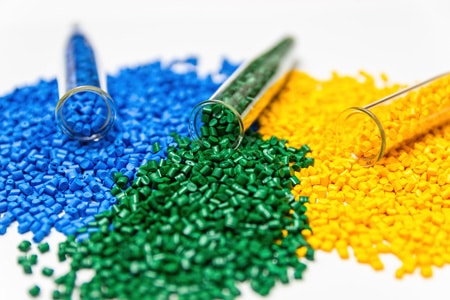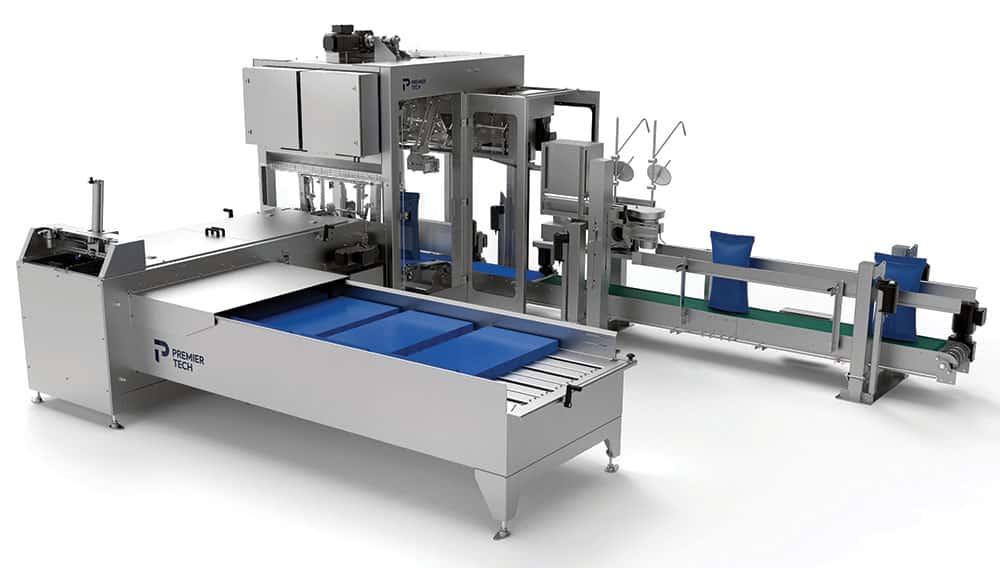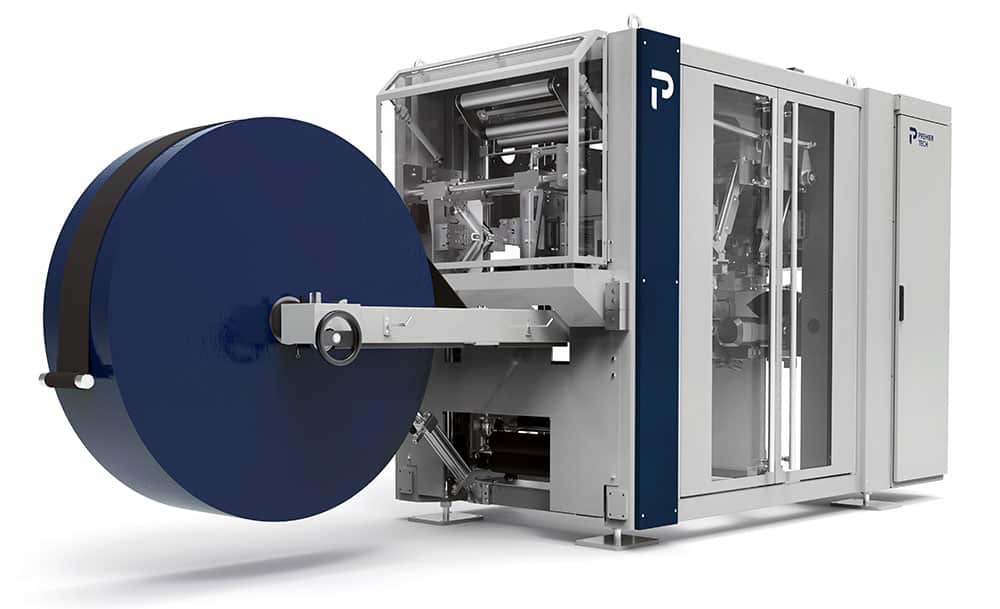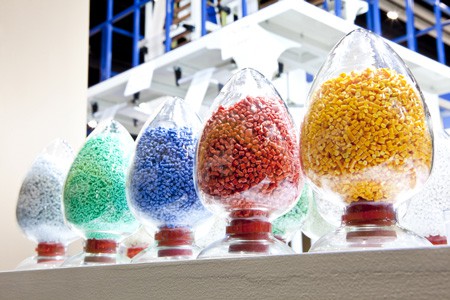Plastic is one of the most common materials used in the production of products and packaging. It is lightweight and has a wide variety of textures and colours, making it ideal for various types of merchandise. Furthermore, plastic has ideal characteristics, being waterproof, thermal resistant, and electric resistant, all which make it a great replacement for other substances.
Plastic pellets are tiny plastic granules. The majority of consumer products today are made from plastic pellets which are melted down and remoulded into the required shape; this is why they are an incredibly important material for many industries, around the world. Plastic pellets are indispensable in the production process, particularly to produce medical equipment and electronic devices, which is growing rapidly. Thus, the plastic pellet market has great potential to grow. Average annual sales are also expected to soar.

In this article, Premier Tech, as a leading automatic bagging machine manufacturer, hopes to shed some light on important industry insights, challenges, and how businesses can prepare themselves for the changes to come.
Growth Factors: Challenges for the Plastic Industry
The plastic market slowed down during the 2020 economic downturn following the widespread COVID-19 pandemic, but the situation seems much more optimistic from 2021 so far. This upturn could be attributed to the lessons and preparations the global business industry has taken over the course of the year that have allowed them to recover and even flourish. As a result, the sales of plastic products, as well as exports, are expected to grow at least 2-3 percent this year. Nevertheless, there are still many factors that may affect business growth which companies need to be aware of and find proper solutions for.
Raw Materials for Plastic Pellet Production
Plastics are produced from natural gas. They are the by-product of the distillation of crude oil and the separation of natural gas. As a result, the price of crude oil, an exhausted resource, is subject to volatile price fluctuations which therefore directly impact the cost of plastic production.
The Labour Sector
The central government’s labour cost adjustment policy, and the inflation rate both affect wages. This forces manufacturers to take on more financial burden which is not favourable to them at a time when the economic condition is gradually recovering, and they may need to invest more in other areas.
Demand for Plastic Products
Consumer behaviour and lifestyles have changed drastically in recent years. With the ongoing COVID-19 pandemic, some businesses have required more plastic for their production than ever before. The rise of e-commerce has also resulted in the production of many new products. And in the food industry, there has also been high demand for plastic packaging.
The Eco Trend and “Green” Packaging
One of the biggest challenges for plastic manufacturers is the eco-friendly trend with consumers trying to reduce their consumption of single-use plastics in order to lower their impact on the environment. Biodegradable and reusable plastics are, therefore, in higher demand. Additionally, many countries have enforced measures to ban or reduce the use of plastic. This directly affects the export industry and is something companies need to be aware of, and adapt to, accordingly.
Changing Trends: Which Industries Need More Plastics?
Consumer behaviour varies with changes in society and trends around the world. The trend for plastic use is ever-changing. Specifically, there remains high demand for plastics in the following industries:
- Medical Equipment: As medical technology advances, there is higher demand for plastic in the production of protective equipment, healthcare equipment, and various tools, to support the growing number of patients in various medical services.
- Consumer Products: It is an ever-growing business group that requires a lot of plastic packaging for a variety of uses including cleaning supplies, cosmetics, snacks, ready meals, and sachets. The rise of delivery and takeaway businesses also means there has been an increase in plastic packaging, from boxes and bags to cutlery.
- Automotive Parts: The up-and-coming “eco car” trend is a potential opportunity to export more car parts in the future.
- Electronic Parts: Smartphones, computers, and electrical appliances are constantly evolving. Plus, they are always in high demand throughout the world. As a result, the sales of plastic pellets to these companies is growing.
Construction: The expansion of infrastructure, as well as new construction projects in the private sector, have led to an increase in the use of plastic equipment. Additionally, many new building materials have been developed that focus on strength, toughness, durability, and being lightweight; all of which are the winning characteristics of plastic.
Adapting to Meet the Challenges
- Analyse the strengths of your own factory and adjust the production of plastic resin in line with the market trends.
- Expand your customer base to include growing businesses that require a lot of plastic, and also businesses that use plastics to produce high-value products such as medical equipment, IT equipment, and car parts.
- Despite the campaign to phase out single-use plastics, manufacturers will not have to slow down their entire production. They can find new opportunities by producing biodegradable plastics instead. In addition to being more environmentally friendly, it also supports cassava and sugarcane farmers, as both plants are main components of biodegradable plastics.
- The most important step is to optimize your production process. You can do so by reducing labour-related tasks and transitioning them to automated solutions. For example, the TTFS automatic bagging machine from Premier Tech has both a weighing scale and bagging machine. So, you can weigh the product and fill the bags at the same time. With the reduced need for human intervention during the process, workers can then be trained and moved to other more beneficial tasks.
Tips for Selecting an Automatic Bagging Machine
 Automatic bagging machines can play a major part for factory owners and manufacturers in transforming their business in line with changes in both the domestic and international market.
Automatic bagging machines can play a major part for factory owners and manufacturers in transforming their business in line with changes in both the domestic and international market.
The team at Premier Tech has some tips for choosing the right automatic bagging machine for your business:
- The bagging speed should be more than 2,000 bags per hour.
- The machine should have an additional reel for quicker bag roll changing.
- The machine must be able to automatically cut bags to reduce labor and time.
- The machine should be compact and not take up a lot of space.
- It should suck the air out of the bag with ease.

The machine must be able to be dismantled for cleaning to ensure the hygiene standards of the factory.
These are our basic tips for choosing an automatic bagging machine. The TFFS automatic bagging machine from Premier Tech doesn’t just have all the necessary qualities, it is also highly efficient. Additionally, we know that after-sales service is just as important.
We are also a Total Solution Provider and can help design custom-made machines that best suit your factory to effectively enhance your business performance. Contact us for more information.
Premier Tech is one of the largest packaging equipment manufacturers in the world. Well-known in the flexible and rigid packaging industries, PT offers specific packaging machines as well as complete packaging lines for small- and large-scale productions. Its wide product portfolio includes weighing technology, open-mouth bagging machines, valve bagging machines, FFS machines, Bulk Bag filling equipment, robot palletizers for bags, cases and other container, conventional bag palletizers, stretch wrappers, stretch hooders, and conveyors. Moreover, PT offers bulk processing solutions for organic materials.






